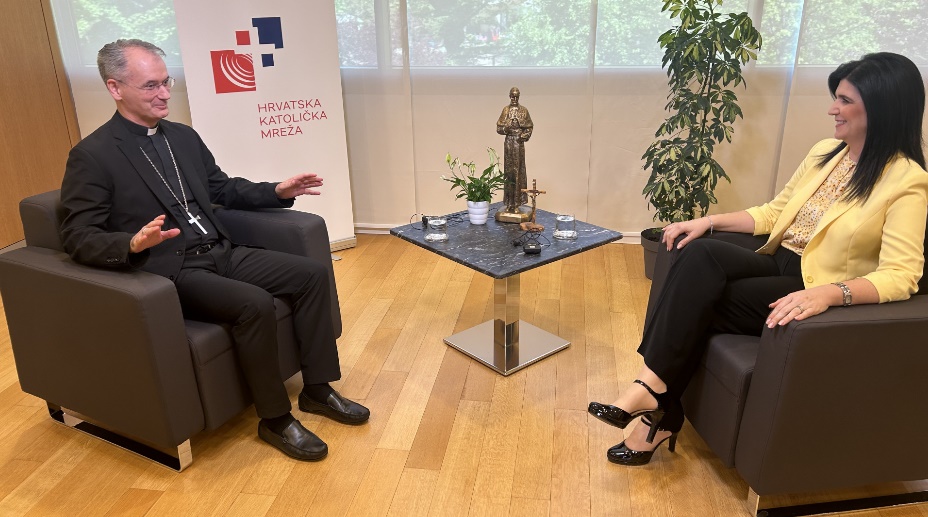First Interview with Archbishop Dražen Kutleša of Zagreb

On Thursday, April 27, 2023, the President of the Croatian Conference of Bishops gave his first interview as the Archbishop of Zagreb to the journalist Tanja Maleš of the Croatian Catholic Network (CCN/HKM). Below is a translation of their conversation.
Jesus came to earth to save people
Msgr. Kutleša said that his guiding thought is the reason that Jesus came to earth: to save people. “I think, therefore, that the role of an archbishop, to guide people to transcendence, to God, is very important. The purpose of the Church is to save people, to help them in the spiritual realm so that they can save their souls and enter the kingdom of heaven.”Archbishop Kutleša expressed the hope that what he would build and do would not be his own program but rather that of Jesus Christ. “Normally, there will also be other things, which we shall see over time, regarding people’s needs, as parents over time come to see what their children need. It is possible to think one thing at the beginning but it is important to have a goal and know in which direction to go.”
On the canonization of Blessed Alojzije Stepinac and the beatification of Cardinal Franjo Kuharić
Archbishop Kutleša noted that the canonization of Blessed Alojzije Stepinac, as for every candidate, is decided by the Universal Church. He expressed the hope it will take place within the next twenty or so years and called for prayer for this intention.He added that this is a time for studying Alojzije Stepinac. “We also have other saints and do everything until their canonization and then, when we canonize them, we easily forget them and cease to follow them. Perhaps we mention them on some occasions, perhaps in some places where they are venerated and there is great piety. I think that now is the time to devote ourselves to prayer and to what the Blessed Alojzije Stepinac did, not only in the Church but also in the nation.”
Even as a seminarian, Msgr. Kutleša took Stepinac as his role model, and at his episcopal ordination in 2011 he adopted Stepinac’s episcopal moto as his own: “In you, O Lord, I trust!” (Ps 31:15).
Speaking of his predecessors on the cathedra of the Archbishop of Zagreb, Msgr. Kutleša observed that the Church has a continuity, in which it is necessary to respect tradition, but it is also important to have great role models to show the way, such as Blessed Alojzije Stepinac and Cardinal Franjo Kuharić. Msgr. Kutleša noted that the concept of the Church among the Croats, which Cardinal Kuharić promoted to underscore the unity of the Croatian nation, makes him feel at home in Zagreb, despite coming from another diocese and episcopal conference.
With regard to the Church’s relations with the civil authorities, Msgr. Kutleša said that both the state and Church are here for the sake of the people and are called to cooperate in a concrete manner, each preserving its independence.
On Međugorje
Although the Archbishop of Zagreb has no jurisdiction over Međugorje, he emphasized that as a son of the Church, he respects everything the Church says. “We know that there were apparitions in both Lourdes and Fatima. You are not obligated to believe in them nor are you obligated to go there. We are required to believe in the dogmas about the Blessed Virgin Mary and confess what the Church confesses. With regard to private revelations, for those whom they help, it is good to go and see.”Abusers are a tumor in the body of the Church
As the President of the Croatian Conference of Bishops, Archbishop Kutleša spoke about the preparation of guidelines for dealing with the abuse of minors by Church officials and announced the formation of a central office. The Archbishop’s position is the same as the Vatican’s: there is zero tolerance for abuse, the perpetrators of which he called a tumor in the body of the Church.He said that mistakes in handling abuse have been made. However, it is necessary to do everything to prevent such things. It is necessary to penalize the perpetrators and, at the same time, help the victims.
Today, values are under attack. The fundamental issue is the truth.
With regard to today’s society, in which the Christian truth about man and God’s plan for him is under attack, Msgr. Kutleša emphasized that life from conception to death is being threatened and, therefore, it is necessary to insist on the value of human life.There is a Latin saying that aptly describes today’s society: Ius autem dictum, quia iustum est. Nowadays we sometimes lack common sense and want what cannot exist in nature or according to God’s laws. However, since we have positive laws and can do what we want, laws are adopted that we cannot always comprehend.”
“If we look at the history of mankind, the fundamental question is truth. We see that Pilate asked Jesus: What is truth? This question is always fundamental. However, I should say that for us believers and Christians, perhaps What is truth? is not the right question but, rather, Who is Truth?, because Jesus says: ‘I am the way, and the truth and the life.’”
